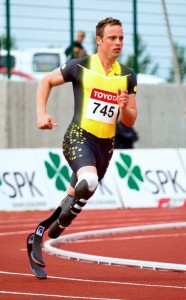 Olympic contender Oscar Pistorius ran the 400 meter race Sunday in 46.54 seconds. That’s a speed of over 19 miles per hour.
Olympic contender Oscar Pistorius ran the 400 meter race Sunday in 46.54 seconds. That’s a speed of over 19 miles per hour.
Stunningly, Kirani James beat Pistorius by 1.95 seconds.
Anyone who has seen Pistorius race knows why James paid him tribute by asking for his name bib: Pistorius runs on prosthetic legs.
Had Pistorius been born any time earlier than the past few decades, chances are he never would have walked, much less joined the ranks of the fastest runners in the world.
What made Pistorius’s historic Olympic run possible? The most obvious answer is Pistorius’s commitment to developing his mind and body to compete in his demanding sport. Yet we should also pay tribute to the Olympian efforts of the man who built the company that built Pistorius’s prosthetic legs:
Össur Kristinsson [was] an Icelandic prosthetist who, in the early 1970’s, focused on designing a better interface for prosthetic sockets. He soon discovered the ideal properties of silicone and put them to work. . . . Within a short space of time his invention was helping thousands of amputees across the world to secure their prosthesis to their limb in a far more effective and comfortable way than ever before.
Now the Össur company builds the Cheetah legs on which Pistorius competes: “a custom-built, high performance carbon fibre foot designed primarily for sporting activities.”
 Had Pistorius been born in the 1800s, he’d have been fortunate to find prosthetic legs that enabled him to walk at all. Today, he wears prosthetics that raise a debate over whether his carbon legs provide him with an unfair advantage over other runners.
Had Pistorius been born in the 1800s, he’d have been fortunate to find prosthetic legs that enabled him to walk at all. Today, he wears prosthetics that raise a debate over whether his carbon legs provide him with an unfair advantage over other runners.
Here’s to James and Pistorius for offering the world the sight of Olympic greatness. And here’s to Kristinsson and the company he developed that designs and markets the prosthetic legs that give Pistorius wings—and that give mobility to countless others.
Like this post? Join our mailing list to receive our weekly digest. And for in-depth commentary from an Objectivist perspective, subscribe to our quarterly journal, The Objective Standard.
Related:
Image: Wikimedia Commons


![[TEST] The Objective Standard](https://test.theobjectivestandard.com/wp-content/uploads/2017/10/logo.png)












